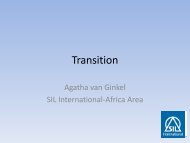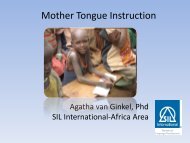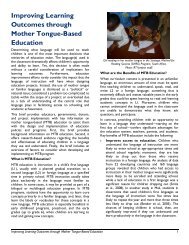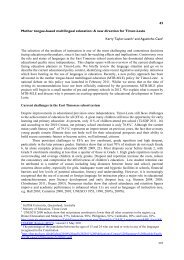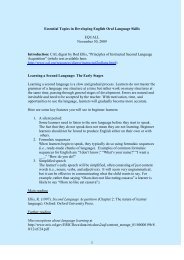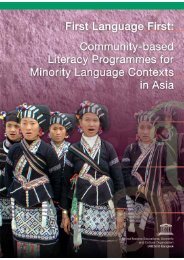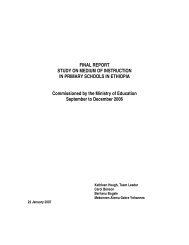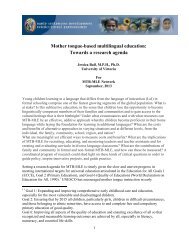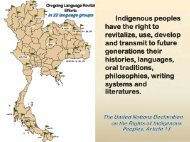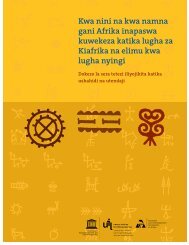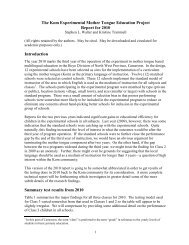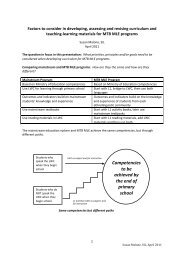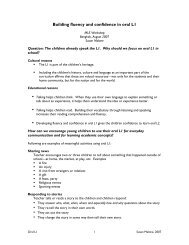Part II.pdf - MTB-MLE Network
Part II.pdf - MTB-MLE Network
Part II.pdf - MTB-MLE Network
Create successful ePaper yourself
Turn your PDF publications into a flip-book with our unique Google optimized e-Paper software.
At the initial planning stage, the participants, comprising NFE administrators, practitioners, adult<br />
educators, linguists and local teachers, shared their experiences reflecting the importance of studying<br />
the needs of the target group and mobilizing the community for participation in the programme.<br />
Some recommendations were:<br />
• Upon joining a literacy class, the ethnic minorities want to focus on oral Thai in order<br />
to communicate with other people.<br />
• Normally, in running literacy class, we set goals of what we want to achieve. However,<br />
we should remember that we should not force people to learn what we want to teach,<br />
but to learn what they want to learn. If they want to start with talking, let them and<br />
encourage them to progress to reading and writing. It’s more important for CLC teachers<br />
to develop relationships with the people and to learn their needs and how help them<br />
achieve their goals.<br />
• The ethnic minorities in remote areas probably will not be interested in literacy. They<br />
are not accustomed to attending literacy classes. A reward, for example, giving them<br />
pigs or chickens to raise or to allow them to watch a television programme at the CLC<br />
after the class, might motivate community members to attend the class. Some learners<br />
want to learn the language of their ancestors in order to read and understand the writings<br />
of the herbalists. The teachers need to know the objectives of the learners.<br />
• Learning is a social process. The target group wants to learn in group. It is the task of<br />
the facilitators to investigate the prior knowledge of the learners and identify the new<br />
things that they want to learn. In working with minorities, the teachers should start<br />
with the learners’ experiences or with their strong points.<br />
• The Karen teacher reflected that it is good to develop the material with both the Karen<br />
and Thai languages so that the Karen will be proud of their language.<br />
• In developing a writing system for minority people, it is important to know what kind<br />
of script they want. If they do not want a particular script or they do not like a particular<br />
script, other choices should be made.<br />
It takes time to study the needs of ethnic minority peoples or to mobilize a community for mother<br />
tongue education. People need to work closely with community members and build trust relationships.<br />
Fortunately, in our project site we have both CLC teachers and Karen teachers staying in the village<br />
who know the local people and can introduce us to the community.<br />
Developing writing systems (orthography development)<br />
This is a very important stage of the project. Linguists in association and cooperation with Pwo<br />
Karens worked together. There were 3 activities:<br />
Activity 1: Workshop on the Examination and Analysis of the Pwo Karen sound system.<br />
(10-14 March 2003, Payap University, Chiang Mai)<br />
The findings of previous research on Pwo Karen in Srisawat District, Kanchanaburi and Hot District,<br />
Chiang Mai, were used as the basis for collecting words to illustrate the Omkoi Pwo Karen sound<br />
system. About 360 words were collected to illustrate the consonants, vowels and tones of Omkoi<br />
206



